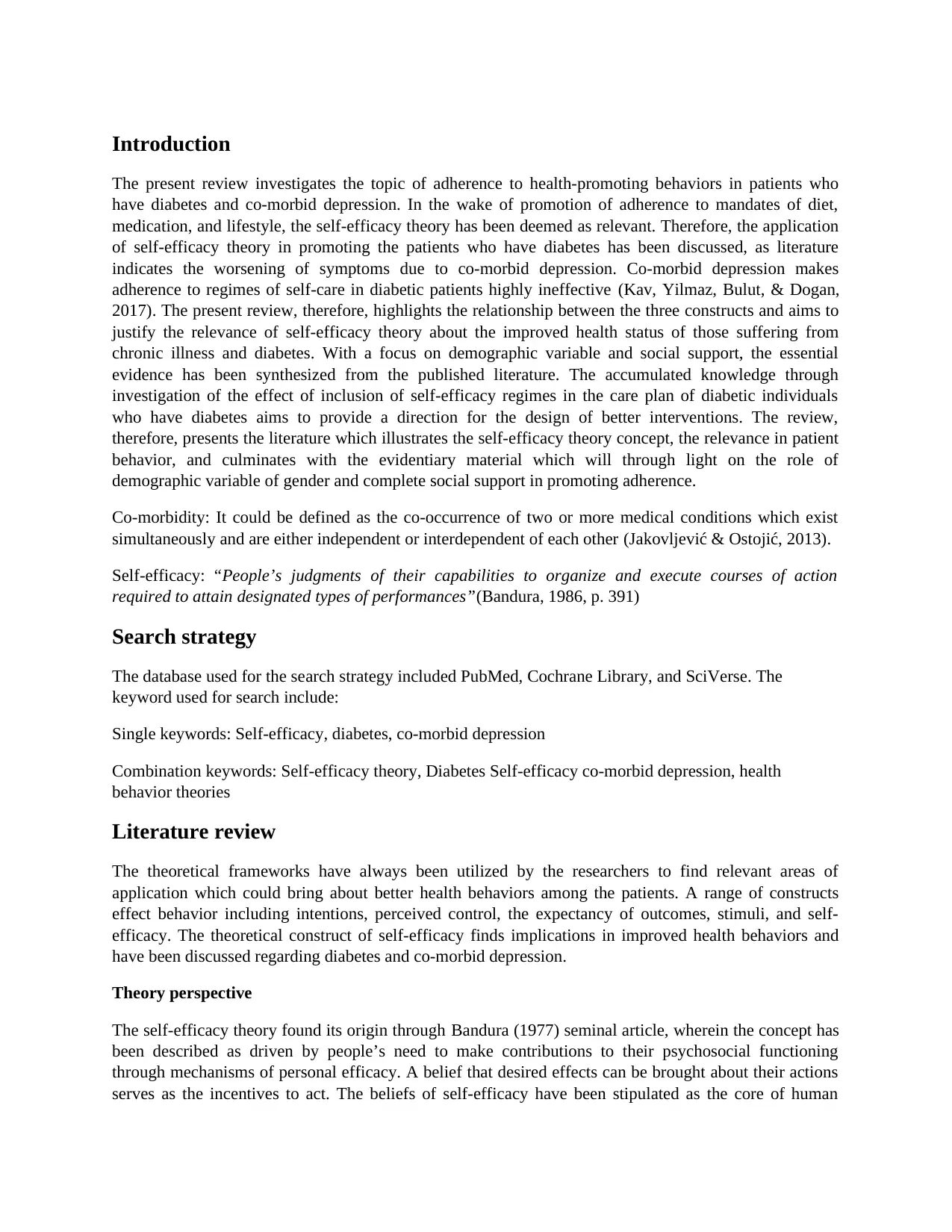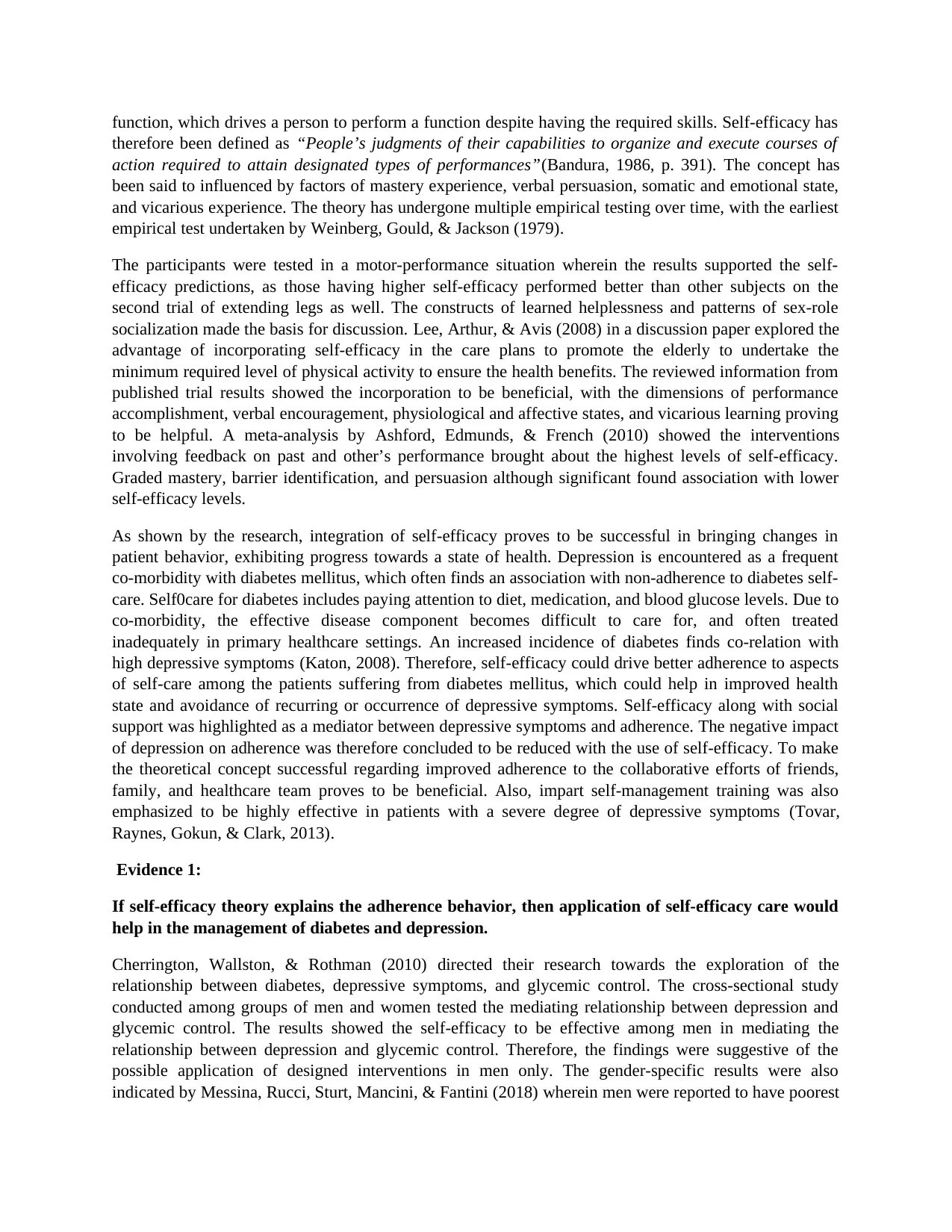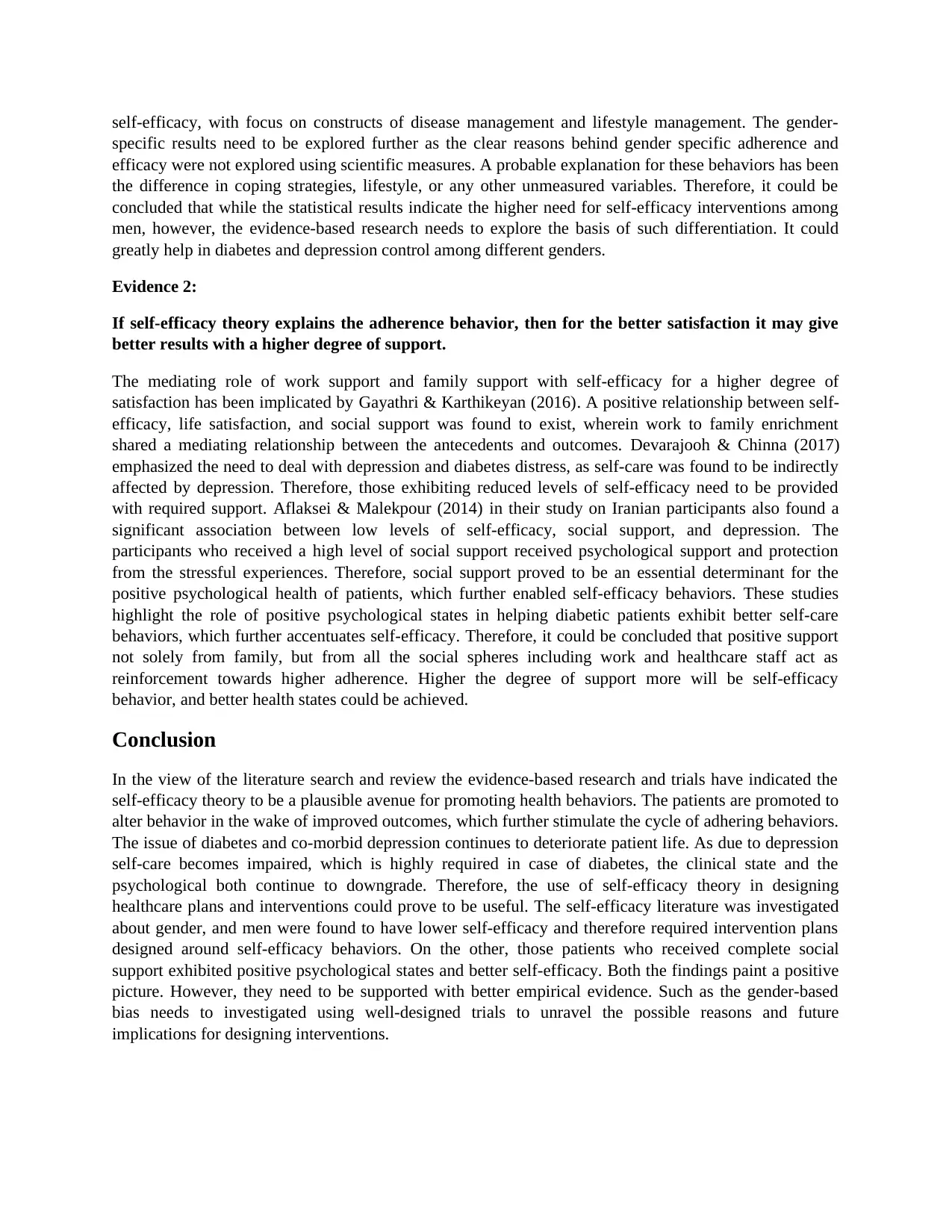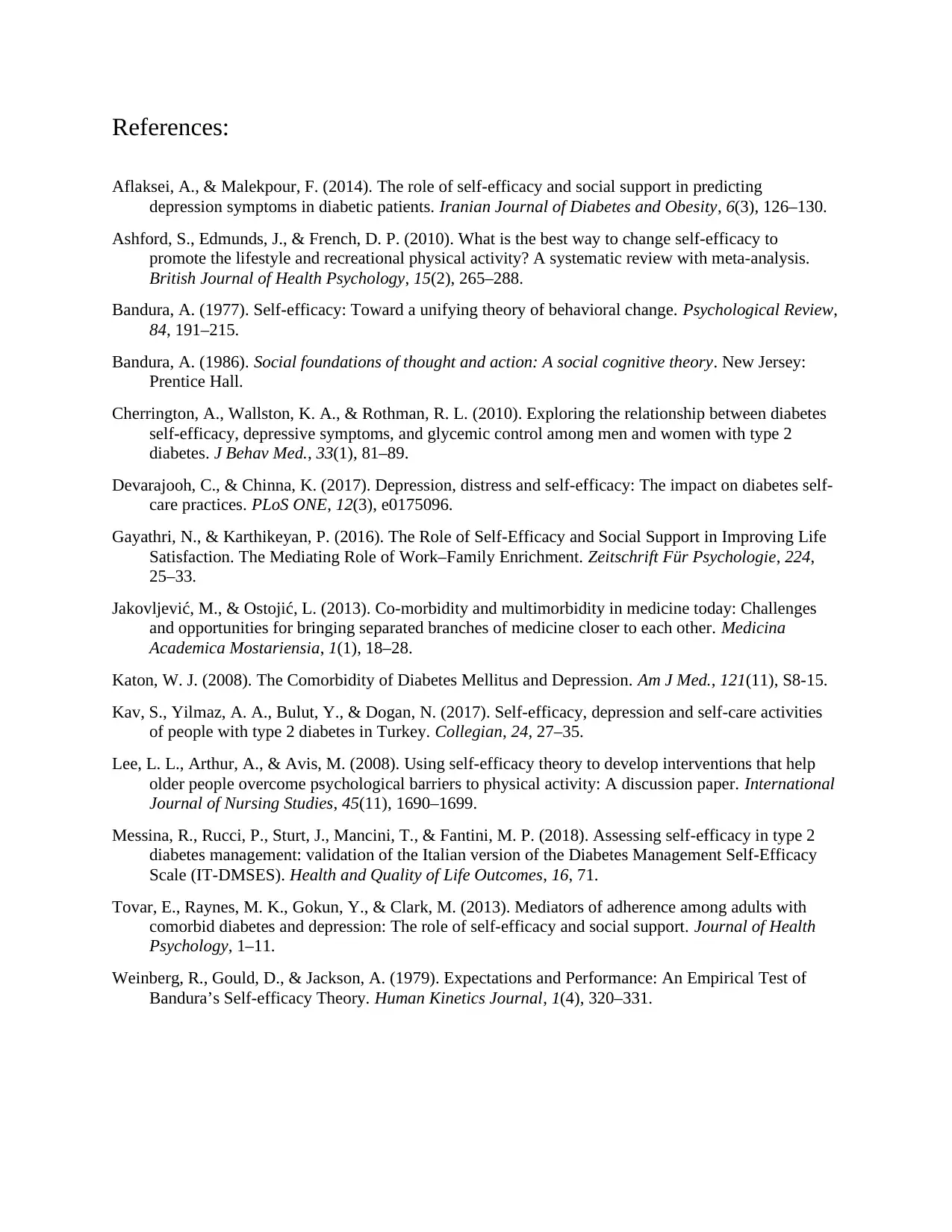The Role of Self-Efficacy Theory in Promoting Adherence to Health-Promoting Behaviors in Patients with Diabetes and Co-Morbid Depression
VerifiedAdded on 2023/06/10
|4
|2337
|413
AI Summary
This review explores the relationship between self-efficacy theory, diabetes, and co-morbid depression. It highlights the relevance of self-efficacy theory in promoting health behaviors and improving health status in patients with chronic illness and diabetes. The review presents evidence on the role of demographic variables and social support in promoting adherence.
Contribute Materials
Your contribution can guide someone’s learning journey. Share your
documents today.

Introduction
The present review investigates the topic of adherence to health-promoting behaviors in patients who
have diabetes and co-morbid depression. In the wake of promotion of adherence to mandates of diet,
medication, and lifestyle, the self-efficacy theory has been deemed as relevant. Therefore, the application
of self-efficacy theory in promoting the patients who have diabetes has been discussed, as literature
indicates the worsening of symptoms due to co-morbid depression. Co-morbid depression makes
adherence to regimes of self-care in diabetic patients highly ineffective (Kav, Yilmaz, Bulut, & Dogan,
2017). The present review, therefore, highlights the relationship between the three constructs and aims to
justify the relevance of self-efficacy theory about the improved health status of those suffering from
chronic illness and diabetes. With a focus on demographic variable and social support, the essential
evidence has been synthesized from the published literature. The accumulated knowledge through
investigation of the effect of inclusion of self-efficacy regimes in the care plan of diabetic individuals
who have diabetes aims to provide a direction for the design of better interventions. The review,
therefore, presents the literature which illustrates the self-efficacy theory concept, the relevance in patient
behavior, and culminates with the evidentiary material which will through light on the role of
demographic variable of gender and complete social support in promoting adherence.
Co-morbidity: It could be defined as the co-occurrence of two or more medical conditions which exist
simultaneously and are either independent or interdependent of each other (Jakovljević & Ostojić, 2013).
Self-efficacy: “People’s judgments of their capabilities to organize and execute courses of action
required to attain designated types of performances”(Bandura, 1986, p. 391)
Search strategy
The database used for the search strategy included PubMed, Cochrane Library, and SciVerse. The
keyword used for search include:
Single keywords: Self-efficacy, diabetes, co-morbid depression
Combination keywords: Self-efficacy theory, Diabetes Self-efficacy co-morbid depression, health
behavior theories
Literature review
The theoretical frameworks have always been utilized by the researchers to find relevant areas of
application which could bring about better health behaviors among the patients. A range of constructs
effect behavior including intentions, perceived control, the expectancy of outcomes, stimuli, and self-
efficacy. The theoretical construct of self-efficacy finds implications in improved health behaviors and
have been discussed regarding diabetes and co-morbid depression.
Theory perspective
The self-efficacy theory found its origin through Bandura (1977) seminal article, wherein the concept has
been described as driven by people’s need to make contributions to their psychosocial functioning
through mechanisms of personal efficacy. A belief that desired effects can be brought about their actions
serves as the incentives to act. The beliefs of self-efficacy have been stipulated as the core of human
The present review investigates the topic of adherence to health-promoting behaviors in patients who
have diabetes and co-morbid depression. In the wake of promotion of adherence to mandates of diet,
medication, and lifestyle, the self-efficacy theory has been deemed as relevant. Therefore, the application
of self-efficacy theory in promoting the patients who have diabetes has been discussed, as literature
indicates the worsening of symptoms due to co-morbid depression. Co-morbid depression makes
adherence to regimes of self-care in diabetic patients highly ineffective (Kav, Yilmaz, Bulut, & Dogan,
2017). The present review, therefore, highlights the relationship between the three constructs and aims to
justify the relevance of self-efficacy theory about the improved health status of those suffering from
chronic illness and diabetes. With a focus on demographic variable and social support, the essential
evidence has been synthesized from the published literature. The accumulated knowledge through
investigation of the effect of inclusion of self-efficacy regimes in the care plan of diabetic individuals
who have diabetes aims to provide a direction for the design of better interventions. The review,
therefore, presents the literature which illustrates the self-efficacy theory concept, the relevance in patient
behavior, and culminates with the evidentiary material which will through light on the role of
demographic variable of gender and complete social support in promoting adherence.
Co-morbidity: It could be defined as the co-occurrence of two or more medical conditions which exist
simultaneously and are either independent or interdependent of each other (Jakovljević & Ostojić, 2013).
Self-efficacy: “People’s judgments of their capabilities to organize and execute courses of action
required to attain designated types of performances”(Bandura, 1986, p. 391)
Search strategy
The database used for the search strategy included PubMed, Cochrane Library, and SciVerse. The
keyword used for search include:
Single keywords: Self-efficacy, diabetes, co-morbid depression
Combination keywords: Self-efficacy theory, Diabetes Self-efficacy co-morbid depression, health
behavior theories
Literature review
The theoretical frameworks have always been utilized by the researchers to find relevant areas of
application which could bring about better health behaviors among the patients. A range of constructs
effect behavior including intentions, perceived control, the expectancy of outcomes, stimuli, and self-
efficacy. The theoretical construct of self-efficacy finds implications in improved health behaviors and
have been discussed regarding diabetes and co-morbid depression.
Theory perspective
The self-efficacy theory found its origin through Bandura (1977) seminal article, wherein the concept has
been described as driven by people’s need to make contributions to their psychosocial functioning
through mechanisms of personal efficacy. A belief that desired effects can be brought about their actions
serves as the incentives to act. The beliefs of self-efficacy have been stipulated as the core of human
Secure Best Marks with AI Grader
Need help grading? Try our AI Grader for instant feedback on your assignments.

function, which drives a person to perform a function despite having the required skills. Self-efficacy has
therefore been defined as “People’s judgments of their capabilities to organize and execute courses of
action required to attain designated types of performances”(Bandura, 1986, p. 391). The concept has
been said to influenced by factors of mastery experience, verbal persuasion, somatic and emotional state,
and vicarious experience. The theory has undergone multiple empirical testing over time, with the earliest
empirical test undertaken by Weinberg, Gould, & Jackson (1979).
The participants were tested in a motor-performance situation wherein the results supported the self-
efficacy predictions, as those having higher self-efficacy performed better than other subjects on the
second trial of extending legs as well. The constructs of learned helplessness and patterns of sex-role
socialization made the basis for discussion. Lee, Arthur, & Avis (2008) in a discussion paper explored the
advantage of incorporating self-efficacy in the care plans to promote the elderly to undertake the
minimum required level of physical activity to ensure the health benefits. The reviewed information from
published trial results showed the incorporation to be beneficial, with the dimensions of performance
accomplishment, verbal encouragement, physiological and affective states, and vicarious learning proving
to be helpful. A meta-analysis by Ashford, Edmunds, & French (2010) showed the interventions
involving feedback on past and other’s performance brought about the highest levels of self-efficacy.
Graded mastery, barrier identification, and persuasion although significant found association with lower
self-efficacy levels.
As shown by the research, integration of self-efficacy proves to be successful in bringing changes in
patient behavior, exhibiting progress towards a state of health. Depression is encountered as a frequent
co-morbidity with diabetes mellitus, which often finds an association with non-adherence to diabetes self-
care. Self0care for diabetes includes paying attention to diet, medication, and blood glucose levels. Due to
co-morbidity, the effective disease component becomes difficult to care for, and often treated
inadequately in primary healthcare settings. An increased incidence of diabetes finds co-relation with
high depressive symptoms (Katon, 2008). Therefore, self-efficacy could drive better adherence to aspects
of self-care among the patients suffering from diabetes mellitus, which could help in improved health
state and avoidance of recurring or occurrence of depressive symptoms. Self-efficacy along with social
support was highlighted as a mediator between depressive symptoms and adherence. The negative impact
of depression on adherence was therefore concluded to be reduced with the use of self-efficacy. To make
the theoretical concept successful regarding improved adherence to the collaborative efforts of friends,
family, and healthcare team proves to be beneficial. Also, impart self-management training was also
emphasized to be highly effective in patients with a severe degree of depressive symptoms (Tovar,
Raynes, Gokun, & Clark, 2013).
Evidence 1:
If self-efficacy theory explains the adherence behavior, then application of self-efficacy care would
help in the management of diabetes and depression.
Cherrington, Wallston, & Rothman (2010) directed their research towards the exploration of the
relationship between diabetes, depressive symptoms, and glycemic control. The cross-sectional study
conducted among groups of men and women tested the mediating relationship between depression and
glycemic control. The results showed the self-efficacy to be effective among men in mediating the
relationship between depression and glycemic control. Therefore, the findings were suggestive of the
possible application of designed interventions in men only. The gender-specific results were also
indicated by Messina, Rucci, Sturt, Mancini, & Fantini (2018) wherein men were reported to have poorest
therefore been defined as “People’s judgments of their capabilities to organize and execute courses of
action required to attain designated types of performances”(Bandura, 1986, p. 391). The concept has
been said to influenced by factors of mastery experience, verbal persuasion, somatic and emotional state,
and vicarious experience. The theory has undergone multiple empirical testing over time, with the earliest
empirical test undertaken by Weinberg, Gould, & Jackson (1979).
The participants were tested in a motor-performance situation wherein the results supported the self-
efficacy predictions, as those having higher self-efficacy performed better than other subjects on the
second trial of extending legs as well. The constructs of learned helplessness and patterns of sex-role
socialization made the basis for discussion. Lee, Arthur, & Avis (2008) in a discussion paper explored the
advantage of incorporating self-efficacy in the care plans to promote the elderly to undertake the
minimum required level of physical activity to ensure the health benefits. The reviewed information from
published trial results showed the incorporation to be beneficial, with the dimensions of performance
accomplishment, verbal encouragement, physiological and affective states, and vicarious learning proving
to be helpful. A meta-analysis by Ashford, Edmunds, & French (2010) showed the interventions
involving feedback on past and other’s performance brought about the highest levels of self-efficacy.
Graded mastery, barrier identification, and persuasion although significant found association with lower
self-efficacy levels.
As shown by the research, integration of self-efficacy proves to be successful in bringing changes in
patient behavior, exhibiting progress towards a state of health. Depression is encountered as a frequent
co-morbidity with diabetes mellitus, which often finds an association with non-adherence to diabetes self-
care. Self0care for diabetes includes paying attention to diet, medication, and blood glucose levels. Due to
co-morbidity, the effective disease component becomes difficult to care for, and often treated
inadequately in primary healthcare settings. An increased incidence of diabetes finds co-relation with
high depressive symptoms (Katon, 2008). Therefore, self-efficacy could drive better adherence to aspects
of self-care among the patients suffering from diabetes mellitus, which could help in improved health
state and avoidance of recurring or occurrence of depressive symptoms. Self-efficacy along with social
support was highlighted as a mediator between depressive symptoms and adherence. The negative impact
of depression on adherence was therefore concluded to be reduced with the use of self-efficacy. To make
the theoretical concept successful regarding improved adherence to the collaborative efforts of friends,
family, and healthcare team proves to be beneficial. Also, impart self-management training was also
emphasized to be highly effective in patients with a severe degree of depressive symptoms (Tovar,
Raynes, Gokun, & Clark, 2013).
Evidence 1:
If self-efficacy theory explains the adherence behavior, then application of self-efficacy care would
help in the management of diabetes and depression.
Cherrington, Wallston, & Rothman (2010) directed their research towards the exploration of the
relationship between diabetes, depressive symptoms, and glycemic control. The cross-sectional study
conducted among groups of men and women tested the mediating relationship between depression and
glycemic control. The results showed the self-efficacy to be effective among men in mediating the
relationship between depression and glycemic control. Therefore, the findings were suggestive of the
possible application of designed interventions in men only. The gender-specific results were also
indicated by Messina, Rucci, Sturt, Mancini, & Fantini (2018) wherein men were reported to have poorest

self-efficacy, with focus on constructs of disease management and lifestyle management. The gender-
specific results need to be explored further as the clear reasons behind gender specific adherence and
efficacy were not explored using scientific measures. A probable explanation for these behaviors has been
the difference in coping strategies, lifestyle, or any other unmeasured variables. Therefore, it could be
concluded that while the statistical results indicate the higher need for self-efficacy interventions among
men, however, the evidence-based research needs to explore the basis of such differentiation. It could
greatly help in diabetes and depression control among different genders.
Evidence 2:
If self-efficacy theory explains the adherence behavior, then for the better satisfaction it may give
better results with a higher degree of support.
The mediating role of work support and family support with self-efficacy for a higher degree of
satisfaction has been implicated by Gayathri & Karthikeyan (2016). A positive relationship between self-
efficacy, life satisfaction, and social support was found to exist, wherein work to family enrichment
shared a mediating relationship between the antecedents and outcomes. Devarajooh & Chinna (2017)
emphasized the need to deal with depression and diabetes distress, as self-care was found to be indirectly
affected by depression. Therefore, those exhibiting reduced levels of self-efficacy need to be provided
with required support. Aflaksei & Malekpour (2014) in their study on Iranian participants also found a
significant association between low levels of self-efficacy, social support, and depression. The
participants who received a high level of social support received psychological support and protection
from the stressful experiences. Therefore, social support proved to be an essential determinant for the
positive psychological health of patients, which further enabled self-efficacy behaviors. These studies
highlight the role of positive psychological states in helping diabetic patients exhibit better self-care
behaviors, which further accentuates self-efficacy. Therefore, it could be concluded that positive support
not solely from family, but from all the social spheres including work and healthcare staff act as
reinforcement towards higher adherence. Higher the degree of support more will be self-efficacy
behavior, and better health states could be achieved.
Conclusion
In the view of the literature search and review the evidence-based research and trials have indicated the
self-efficacy theory to be a plausible avenue for promoting health behaviors. The patients are promoted to
alter behavior in the wake of improved outcomes, which further stimulate the cycle of adhering behaviors.
The issue of diabetes and co-morbid depression continues to deteriorate patient life. As due to depression
self-care becomes impaired, which is highly required in case of diabetes, the clinical state and the
psychological both continue to downgrade. Therefore, the use of self-efficacy theory in designing
healthcare plans and interventions could prove to be useful. The self-efficacy literature was investigated
about gender, and men were found to have lower self-efficacy and therefore required intervention plans
designed around self-efficacy behaviors. On the other, those patients who received complete social
support exhibited positive psychological states and better self-efficacy. Both the findings paint a positive
picture. However, they need to be supported with better empirical evidence. Such as the gender-based
bias needs to investigated using well-designed trials to unravel the possible reasons and future
implications for designing interventions.
specific results need to be explored further as the clear reasons behind gender specific adherence and
efficacy were not explored using scientific measures. A probable explanation for these behaviors has been
the difference in coping strategies, lifestyle, or any other unmeasured variables. Therefore, it could be
concluded that while the statistical results indicate the higher need for self-efficacy interventions among
men, however, the evidence-based research needs to explore the basis of such differentiation. It could
greatly help in diabetes and depression control among different genders.
Evidence 2:
If self-efficacy theory explains the adherence behavior, then for the better satisfaction it may give
better results with a higher degree of support.
The mediating role of work support and family support with self-efficacy for a higher degree of
satisfaction has been implicated by Gayathri & Karthikeyan (2016). A positive relationship between self-
efficacy, life satisfaction, and social support was found to exist, wherein work to family enrichment
shared a mediating relationship between the antecedents and outcomes. Devarajooh & Chinna (2017)
emphasized the need to deal with depression and diabetes distress, as self-care was found to be indirectly
affected by depression. Therefore, those exhibiting reduced levels of self-efficacy need to be provided
with required support. Aflaksei & Malekpour (2014) in their study on Iranian participants also found a
significant association between low levels of self-efficacy, social support, and depression. The
participants who received a high level of social support received psychological support and protection
from the stressful experiences. Therefore, social support proved to be an essential determinant for the
positive psychological health of patients, which further enabled self-efficacy behaviors. These studies
highlight the role of positive psychological states in helping diabetic patients exhibit better self-care
behaviors, which further accentuates self-efficacy. Therefore, it could be concluded that positive support
not solely from family, but from all the social spheres including work and healthcare staff act as
reinforcement towards higher adherence. Higher the degree of support more will be self-efficacy
behavior, and better health states could be achieved.
Conclusion
In the view of the literature search and review the evidence-based research and trials have indicated the
self-efficacy theory to be a plausible avenue for promoting health behaviors. The patients are promoted to
alter behavior in the wake of improved outcomes, which further stimulate the cycle of adhering behaviors.
The issue of diabetes and co-morbid depression continues to deteriorate patient life. As due to depression
self-care becomes impaired, which is highly required in case of diabetes, the clinical state and the
psychological both continue to downgrade. Therefore, the use of self-efficacy theory in designing
healthcare plans and interventions could prove to be useful. The self-efficacy literature was investigated
about gender, and men were found to have lower self-efficacy and therefore required intervention plans
designed around self-efficacy behaviors. On the other, those patients who received complete social
support exhibited positive psychological states and better self-efficacy. Both the findings paint a positive
picture. However, they need to be supported with better empirical evidence. Such as the gender-based
bias needs to investigated using well-designed trials to unravel the possible reasons and future
implications for designing interventions.

References:
Aflaksei, A., & Malekpour, F. (2014). The role of self-efficacy and social support in predicting
depression symptoms in diabetic patients. Iranian Journal of Diabetes and Obesity, 6(3), 126–130.
Ashford, S., Edmunds, J., & French, D. P. (2010). What is the best way to change self‐efficacy to
promote the lifestyle and recreational physical activity? A systematic review with meta‐analysis.
British Journal of Health Psychology, 15(2), 265–288.
Bandura, A. (1977). Self-efficacy: Toward a unifying theory of behavioral change. Psychological Review,
84, 191–215.
Bandura, A. (1986). Social foundations of thought and action: A social cognitive theory. New Jersey:
Prentice Hall.
Cherrington, A., Wallston, K. A., & Rothman, R. L. (2010). Exploring the relationship between diabetes
self-efficacy, depressive symptoms, and glycemic control among men and women with type 2
diabetes. J Behav Med., 33(1), 81–89.
Devarajooh, C., & Chinna, K. (2017). Depression, distress and self-efficacy: The impact on diabetes self-
care practices. PLoS ONE, 12(3), e0175096.
Gayathri, N., & Karthikeyan, P. (2016). The Role of Self-Efficacy and Social Support in Improving Life
Satisfaction. The Mediating Role of Work–Family Enrichment. Zeitschrift Für Psychologie, 224,
25–33.
Jakovljević, M., & Ostojić, L. (2013). Co-morbidity and multimorbidity in medicine today: Challenges
and opportunities for bringing separated branches of medicine closer to each other. Medicina
Academica Mostariensia, 1(1), 18–28.
Katon, W. J. (2008). The Comorbidity of Diabetes Mellitus and Depression. Am J Med., 121(11), S8-15.
Kav, S., Yilmaz, A. A., Bulut, Y., & Dogan, N. (2017). Self-efficacy, depression and self-care activities
of people with type 2 diabetes in Turkey. Collegian, 24, 27–35.
Lee, L. L., Arthur, A., & Avis, M. (2008). Using self-efficacy theory to develop interventions that help
older people overcome psychological barriers to physical activity: A discussion paper. International
Journal of Nursing Studies, 45(11), 1690–1699.
Messina, R., Rucci, P., Sturt, J., Mancini, T., & Fantini, M. P. (2018). Assessing self-efficacy in type 2
diabetes management: validation of the Italian version of the Diabetes Management Self-Efficacy
Scale (IT-DMSES). Health and Quality of Life Outcomes, 16, 71.
Tovar, E., Raynes, M. K., Gokun, Y., & Clark, M. (2013). Mediators of adherence among adults with
comorbid diabetes and depression: The role of self-efficacy and social support. Journal of Health
Psychology, 1–11.
Weinberg, R., Gould, D., & Jackson, A. (1979). Expectations and Performance: An Empirical Test of
Bandura’s Self-efficacy Theory. Human Kinetics Journal, 1(4), 320–331.
Aflaksei, A., & Malekpour, F. (2014). The role of self-efficacy and social support in predicting
depression symptoms in diabetic patients. Iranian Journal of Diabetes and Obesity, 6(3), 126–130.
Ashford, S., Edmunds, J., & French, D. P. (2010). What is the best way to change self‐efficacy to
promote the lifestyle and recreational physical activity? A systematic review with meta‐analysis.
British Journal of Health Psychology, 15(2), 265–288.
Bandura, A. (1977). Self-efficacy: Toward a unifying theory of behavioral change. Psychological Review,
84, 191–215.
Bandura, A. (1986). Social foundations of thought and action: A social cognitive theory. New Jersey:
Prentice Hall.
Cherrington, A., Wallston, K. A., & Rothman, R. L. (2010). Exploring the relationship between diabetes
self-efficacy, depressive symptoms, and glycemic control among men and women with type 2
diabetes. J Behav Med., 33(1), 81–89.
Devarajooh, C., & Chinna, K. (2017). Depression, distress and self-efficacy: The impact on diabetes self-
care practices. PLoS ONE, 12(3), e0175096.
Gayathri, N., & Karthikeyan, P. (2016). The Role of Self-Efficacy and Social Support in Improving Life
Satisfaction. The Mediating Role of Work–Family Enrichment. Zeitschrift Für Psychologie, 224,
25–33.
Jakovljević, M., & Ostojić, L. (2013). Co-morbidity and multimorbidity in medicine today: Challenges
and opportunities for bringing separated branches of medicine closer to each other. Medicina
Academica Mostariensia, 1(1), 18–28.
Katon, W. J. (2008). The Comorbidity of Diabetes Mellitus and Depression. Am J Med., 121(11), S8-15.
Kav, S., Yilmaz, A. A., Bulut, Y., & Dogan, N. (2017). Self-efficacy, depression and self-care activities
of people with type 2 diabetes in Turkey. Collegian, 24, 27–35.
Lee, L. L., Arthur, A., & Avis, M. (2008). Using self-efficacy theory to develop interventions that help
older people overcome psychological barriers to physical activity: A discussion paper. International
Journal of Nursing Studies, 45(11), 1690–1699.
Messina, R., Rucci, P., Sturt, J., Mancini, T., & Fantini, M. P. (2018). Assessing self-efficacy in type 2
diabetes management: validation of the Italian version of the Diabetes Management Self-Efficacy
Scale (IT-DMSES). Health and Quality of Life Outcomes, 16, 71.
Tovar, E., Raynes, M. K., Gokun, Y., & Clark, M. (2013). Mediators of adherence among adults with
comorbid diabetes and depression: The role of self-efficacy and social support. Journal of Health
Psychology, 1–11.
Weinberg, R., Gould, D., & Jackson, A. (1979). Expectations and Performance: An Empirical Test of
Bandura’s Self-efficacy Theory. Human Kinetics Journal, 1(4), 320–331.
1 out of 4
Your All-in-One AI-Powered Toolkit for Academic Success.
+13062052269
info@desklib.com
Available 24*7 on WhatsApp / Email
![[object Object]](/_next/static/media/star-bottom.7253800d.svg)
Unlock your academic potential
© 2024 | Zucol Services PVT LTD | All rights reserved.